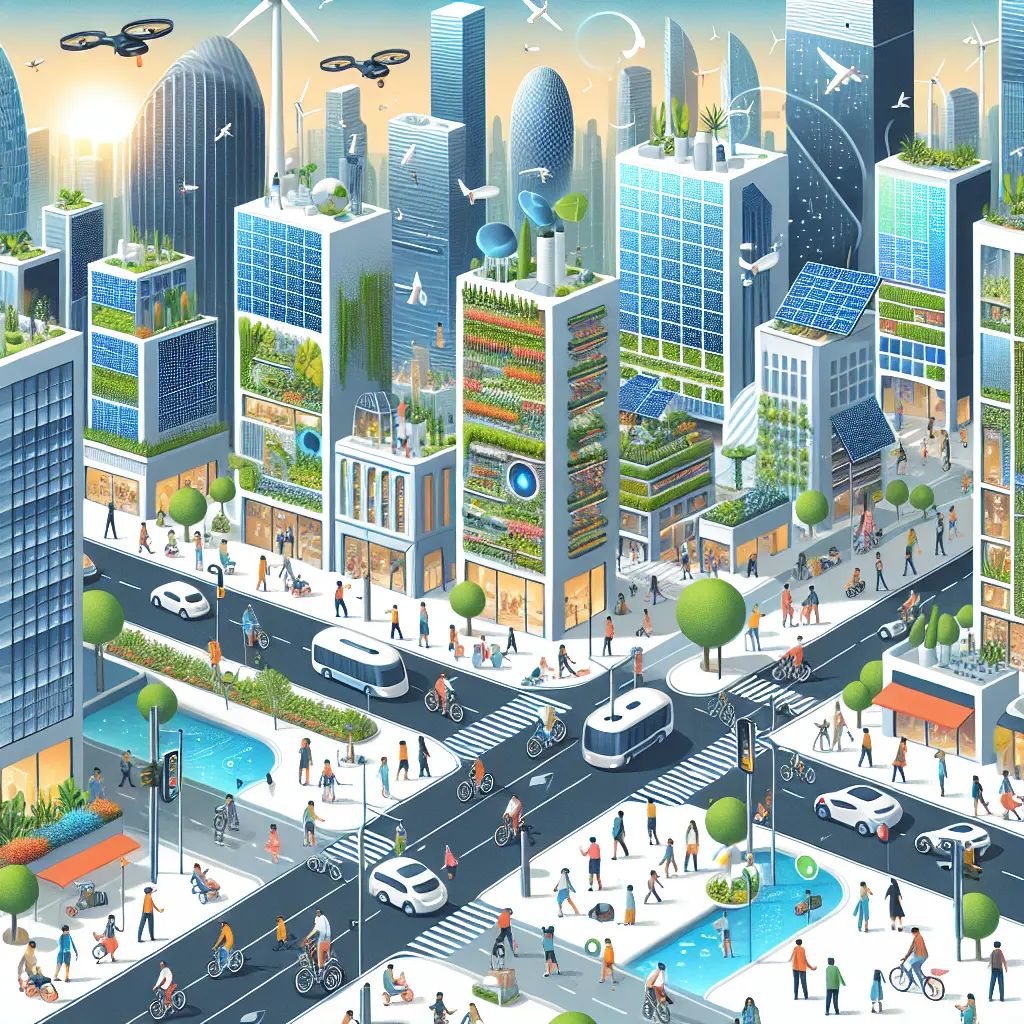
Unleashing the Potential of Sustainable Energy in Smart Cities
As the world urbanizes at an unprecedented rate, smart cities have emerged as a beacon of hope for sustainable urban development. These cities harness cutting-edge technologies and innovative approaches to redefine urban living, emphasizing renewable energy solutions and sustainable power sources. Central to this transformation is the integration of sustainable energy solutions, which are pivotal in shaping the future of smart cities.
The Integration of Renewable Energy in Urban Landscapes
Incorporating renewable energy into smart cities enhances urban energy efficiency and fosters eco-friendly environments. The deployment of smart grid systems and energy management systems has become instrumental in this transition, providing a robust framework for optimizing energy distribution and consumption. Through these technologies, smart city innovations propel us toward a future where energy-efficient infrastructure and smart building technologies are not just aspirational but standard.
The Role of Renewable Energy in Smart City Planning
Renewable energy integration is at the core of sustainable city planning. By incorporating solar, wind, and other clean energy initiatives, cities can significantly reduce their carbon footprints, paving the way for low-carbon cities. Recent studies highlight the immense carbon-saving potential of compact cities, making renewable energy solutions increasingly attractive.
Helsinki, Finland, exemplifies commitment to sustainability through programs like the "90 Day Finn" initiative. Individuals like Andro Lindsay experience firsthand the benefits of living in an eco-friendly city powered by renewable energy. Helsinki's efforts demonstrate how urban sustainability can be achieved by prioritizing renewable energy integration.
Optimizing Urban Energy Efficiency with Smart Grid Systems
Smart grid systems play a crucial role in advancing urban energy efficiency. By utilizing advanced technology to monitor and manage energy distribution, these systems ensure efficient power use across cities. In Australia, implementing controlled load systems offers residents cheaper electricity during off-peak hours, showcasing smart grid systems' contribution to energy efficiency.
Moreover, smart grid innovations are essential in managing the growing demand for electric vehicle charging stations in cities transitioning to greener transportation options. By optimizing energy consumption and distribution, smart grids support sustainable power sources while minimizing wastage.
Pioneering Energy-Efficient Infrastructure with Smart Building Technologies
Smart building technologies represent a significant leap forward in constructing energy-efficient infrastructure. Innovations like energy management systems automate lighting, heating, and cooling based on occupancy and usage patterns. Cities adopting smart building technologies witness substantial reductions in energy consumption, promoting both economic savings and environmental benefits.
In Detroit, the introduction of autonomous shuttle programs for senior citizens highlights the city's commitment to integrating smart technologies into urban mobility solutions. These initiatives align with broader efforts to enhance urban mobility through smart city innovations, offering residents a glimpse into the future of smart cities.
Transforming Urban Landscapes with Green Technology
Green technology plays a pivotal role in creating eco-friendly cities. By leveraging advancements in renewable energy solutions and smart energy solutions, cities achieve sustainable urban development. Public and private sector collaboration is vital in realizing these goals.
Smaller communities like Colorado Springs demonstrate how sustainable city planning can thrive even on a smaller scale. The city's embrace of green technology is exemplified by local businesses prioritizing sustainability in their operations, contributing to a cohesive community effort toward a more sustainable future.
Engaging Communities in Sustainable Urban Development
Community engagement is crucial in driving the adoption of renewable energy solutions and smart building technologies. By involving residents in planning and implementation processes, cities ensure that sustainable urban development meets all stakeholders' needs. This approach fosters a sense of ownership and responsibility among citizens, encouraging active participation in sustainability initiatives.
For example, community-based programs that educate residents about alternative financing options for energy costs effectively reduce reliance on traditional credit card payments for utility bills. These programs alleviate financial burdens and promote informed decision-making regarding energy consumption.
A Holistic Approach to the Future of Smart Cities
The future of smart cities lies in adopting a holistic approach encompassing environmental, economic, and social dimensions. As cities explore innovative ways to integrate sustainable power sources and enhance urban energy efficiency, they must address these changes' broader implications on society.
By fostering collaborations between governments, businesses, and communities, cities can create resilient infrastructures that withstand climate change challenges. The ongoing dialogue surrounding sustainable urban development invites diverse voices to shape the future of smart cities.
Conclusion: Paving the Way for a Sustainable Urban Future
In summary, sustainable energy solutions are indispensable to the evolution of smart cities, redefining urban landscapes with renewable energy, smart grids, and green technologies. By harnessing solar, wind, and other clean energy sources, cities significantly reduce carbon emissions and promote eco-friendly living. Smart grid systems enhance urban energy efficiency by optimizing power distribution and supporting the growing demand for electric vehicles. Meanwhile, smart building technologies revolutionize energy-efficient infrastructure, reducing consumption and fostering economic savings.
Green technology transforms urban landscapes by integrating sustainable practices across public and private sectors. Engaging communities in sustainable development ensures initiatives meet local needs, fostering a shared commitment to sustainability. By involving residents in energy planning and offering alternative financing options, cities empower citizens to make informed decisions about their energy use.
The future of smart cities relies on a holistic approach addressing environmental, economic, and social dimensions. Through collaboration between governments, businesses, and communities, resilient infrastructures can be built to face climate change challenges. This ongoing dialogue invites diverse perspectives to shape a sustainable future.
As we look ahead, let us remain committed to creating vibrant, eco-friendly urban environments prioritizing both people and the planet. Consider your role in this transformative journey—whether by adopting renewable energy in your own life, participating in community initiatives, or advocating for sustainable practices. I invite you to share your experiences or insights on how we can collectively advance towards more sustainable cities. What steps will you take today to contribute to this vision? Let's continue this conversation and inspire each other to make a lasting impact.
Walter Jennings